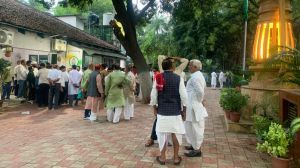Food Ministry chalks up Rs 100 crore as two months’ subsidy bill on rice
NEW DELHI, NOV 17: The Food Ministry is likely to chalk up an additional subsidy bill for two months of Rs 100 crore by the end of Novembe...

NEW DELHI, NOV 17: The Food Ministry is likely to chalk up an additional subsidy bill for two months of Rs 100 crore by the end of November, for their failiure to revise the issue price of rice by around 40 paise per kg alongwith the recent increase in the Minimum Support Price of paddy. What is worse, not raising the issue price virtually goes against the Cabinet’s earlier decision in April last under which every time the “economic cost” of foodgrains distributed through the Public Distribution System is revised, the issue prices should be automatically adjusted.
At that stage, the government had decided that foodgrains would be made available to people above the poverty line (APL) drawing rations from the PDS, at rates equal to the economic cost while people below the poverty line (BPL) would be given these grains at prices half of the economic cost. The calculations of the economic cost itself are based on the minimum support price, mandi handling charges for grains, taxes paid at the state level as well as carrying costs with interest and storage cost componenets.
The government had raised the MSP for paddy by Rs 20 per tonne effective from October 1 – Rs 510 per quintal for the common variety of rice from last year’s level of Rs 490 and Rs 540 per quintal for fine varieties, up from the level of Rs 520 per quintal. For every Rs one per quintal increase in the MSP or procurement costs, the Food Ministry estimates that the economic cost would increase of these grains normally goes up by Rs 1.70 to Rs 2.00 per quintal.
As a result, the Rs 20 per quintal increase in the MSP should actually have resulted in increases of around Rs 35 to Rs 40 per quintal of rice or Rs 35 to 40 paise increase per kg of rice distributed through the PDS.
The Food Ministry estimates show that the offtake of rice evry month is in the region of 12 lakh tonnes. As a result of not revising the issue prices, the additional subsidy borne is almost Rs 48 crore every month. For October and November alone the government has thus chalked up additional subsidies of almost Rs 100 crore.
According to sources, the Catch -22 situation in this is a political one. While in its great wisdom and pro-farmer policies, the government decided to raise the MSP by Rs 20 per quintal even when the procurement dynamics did not warrant it considering that the government granaries are over flowing with grains – nearly 22 to 24 million tonnes over the buffer stock requirements. Thanks to these excess stocks, the government, experts say, is embarassed to raise the issue prices as any increases in foodgrain prices distributed through the PDS normally turns out to be a political flashpoint with the BJP allies criticising it as much as Opposition parties. It is this concern that has put the government on the defensive.
In fact, the dilemma the government is currently facing is that while increases in the issue prices should have been automatic after the Cabinet’s decision in April last, their decision now not to raise the issue price now needs Cabinet sanction. For the last 47 days the government has failed to take the matter to the Cabinet.






- 01
- 02
- 03
- 04
- 05

























